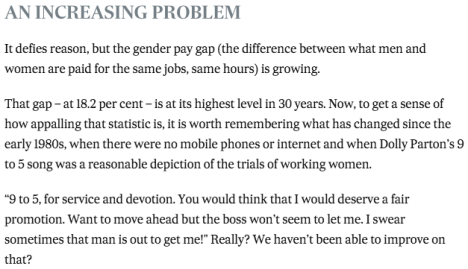Press watchdog finds Financial Review guilty of inaccuracy in gender gap reporting
The Australian Financial Review has been found guilty by the press watchdog of breaching the industry’s standards on accuracy and of not properly correcting an error in its reporting on the gender pay gap.

How the AFR is still reporting the issue online
The Australian Press Council investigated a complaint about an article by journalist Fiona Smith in the AFR last September. The article – “When babies are a good career move” – states as fact that “the difference between what men and women are paid for the same job, same hours” is 18.2%.
However, the number – provided in a report from the Federal Government’s Workplace Gender and Equality Agency – actually referred to the difference between men and women’s average full time equivalent earnings – not for doing the same jobs.


So the Press Council thinks the AFR should be accurate? And the AFR thinks it’s OK to publish stuff that is pure self-interested spin or even deliberately wrong. (Take the recent efforts of its pet galah in the naming of an ex-CEO of Ten)?
The AFR is totally screwed as a product of relevance and is increasingly an oily anchor line for a coterie of ego-driven dirigibles.
Meanwhile the rest of the media world find the press council guilty of irrelevance.
Slow to take action. Action is weak and inconsequential.
Continue.